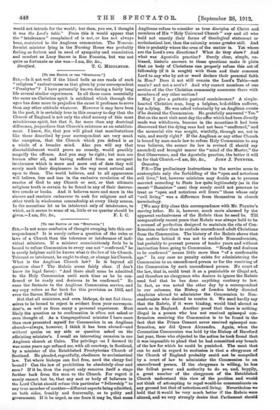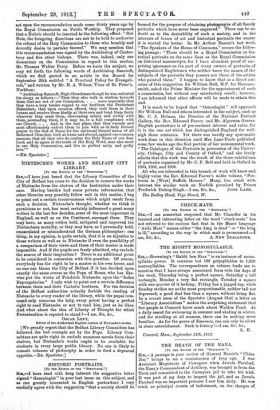[TO TICE EDITOR OF TEE " SPECTATOR:1
Sin,—Is not some confusion of thought creeping into this cor- respondence ? It is surely rather a question of the rides or laws of a Church than the tolerance or intolerance of indi- vidual ministers. If a minister conscientiously feels he is bound to refuse Communion to every one not "confirmed," he is surely helpless until he knows what is the law of his Church. Tolerant or intolerant, he ought to obey, or change his Church. What is the Anglican Church law? Is it beyond all question clear ? The Rubric seems fairly clear. (I don't know its legal force): "And. there shall none be admitted to the Holy Communion until such time as he be con- firmed or be ready and desirous to be confirmed." So runs the footnote to the Anglican Communion service, and my copy refers as far back for this provision as 1662, and even the Sarum Missal of 1549.
But that all ministers, and even bishops, do not feel them- selves to be bound to reject is evident from your correspon- dent's, as well as from many a personal experience. Most likely the question as to confirmation is often not asked or even thought of. As a Congregational minister I have more than once presented myself for Communion in an Anglican church—always, however, I think it has been abroad—and without qualm on my side or question asked on the officiating minister's. I recall an interesting occasion in one Anglican church at Cairo. The privilege ias I deemed it) was some years ago refused me, with all courtesy, in Scotland, by a minister of the Established Presbyterian Church of Scotland. He pleaded, regretfully, obedience to ecclesiastical law. Yet where bishops can feel free, need the clergy feel bound ? Can the law of prohibition be absolutely clear and sure ? If it be, then the regret only removes itself a stage further back from the man to the Church. For regret it surely cannot but be, that any sect or body of believers in the Lord Christ should refuse this particular " fellowship " to any true member of another—different aspects being admitted, on both sides; frankly and fraternally, as to polity and government. If it be urged, as one fears it may be, that some
Anglicans refuse to consider as true disciples of Christ and members of His "Holy Universal Church" any and all who hold not exactly their forms of theological statement- or ecclesiastical law, then the calamity seems greater stslL And
this is probably where the crux of the matter is. Yet where are the Lord's own directions ? What do they show ? And what was Apostolic practice.? Surely clear, simple, un- biased, historic answers to these questions make lit plain. that no body of Christians can properly refuse this act of. fellowship (if it is sought) with them and their common Lord to any who by act or word declare their personal faith in Him ? Does it not still remain the Lord's Table—not- man's ? and not a sect's ? And why cannot members of one section of the One Christian. community commune there with members of any other section?
May I give a pathetic pastoral reminiscence ? A simple- hearted Christian man, long a helpless, bed-ridden sufferer, lay a-dying.He was asked voluntarily by an Anglican curate if he desired the Communion. He gratefully answered "Yes." But on the next visit next day the offer which, had been directly made was withdrawn, because in the meantime it had been discovered that the dying man had not been "confirmed," and the memorial rite was sought, wistfully, through me, not in vain, and surely right P If the Anglican or any other Church is bound by man-made law to refuse Holy Communion to any- true believer, the sooner its law is revised (I should say amended) and brought nearer the "mind of the Master," the first Observance, and the Apostolic practice, the better it will
be for that Church.—I am, Sir, &c., JOHN' 3. POYNTER. Oswestry.
P.5.—The preliminary instructions to the service seem to contemplate only the forbidding of the "open and notorious evil liver," but, however ministers may decide as to persona married according to State law Zeuite legitimately (as in the recent "Bannister" case) they surely could not presume to treat as "open and notorious evil livers" those whose only "evil living" was a difference from themselves in church terminology.
[We may fitly close this correspondence with Mr. Poynter's moving letter. He is, however, much more alarmed by the apparent exclusiveness of the Rubric than he need be. Till i comparatively recent years that Rubric was always held to be a counsel of perfection designed to maintain the rite of Con- firmation rather than to exclude unconfirmed adult Christiana from the Communion. The history of the Rubric shows that the motive behind it was not to exclude Nonconformists, but probably to prevent persons of tender years and without instruction from going to Communion. "Ready and desirous to be confirmed" means little more than "of a confirmable age." In any case no penalty exists for administering the Communion to an. unconfirmed person or for the receiving of the Communion by such unconfirmed person. No court of the law, that is, could treat it as a. punishable or illegal act, and therefore no clergyman who desires to ignore the Rubric need feel that he has done anything contrary to law. In fact, as was noted the other day by a correspondent in our columns, the Bishop of London lately directed chaplains abroad to administer the Communion to Non- conformists who desired to receive it. We need hardly say that the Rubric, if it were binding-, would bind abroad as much as in England. Another proof that there is nothing. illegal in a person who has not received episcopal con- firmation receiving the Communion is to be found in the fact that the Prince Consort never received episcopal con- firmation, nor did Queen Alexandra. Again, when the Coronation Communion was held by the Bishop of Hereford last year, those who objected to the action he took found that it was impossible to plead that he had committed any breach of the law for which he could be punished. The most that can be said in regard to exclusion is that a clergyman of the Church of England probably could not be compelled by a court of law to administer the Communion to an unconfirmed person. If the clergyman is willing, he has the fullest power and authority to do so, and, happily, a great number of the clergymen of the Established Church understand this view of the position and would not think of attempting to repel would-be communicants on any ground but that of notorious evil living. Nevertheless we hold that it would be very much better if the Rubric were altered, and we very strongly desire that Parliament should act upon the recommendation made some thirty years ago by the Royal Commissio'n on Public Worthip. They proposed that a Rubric should be inserted to the following effect: "But Note, the foregoing directions are not to be held to authorize the refusal of the Holy Communion to those who humbly and devoutly desire to partake thereof." We may mention that this recommendation was signed by the Archbishop of Canter- bury and five other bishops. There was, indeed, only one dissentient on the Commission in regard to this matter, Mr. Thomas Walter Perry. Before we leave the subject, we may get forth the following words of Archbishop Sancroft, which we find quoted in an article in the _Record for September 20th entitled "A Practical Policy for Evangeli- cals," and written by Mr. H. A. Wilson, Vicar of St. Peter's, Norbiton:
"Archbishop Sancroft, High Churchman though he was, exhorted his clergy as follows:—' That they also walk in wisdom towards them that are not of our Communion, . . . more especially that they have a very tender regard to our brethren the Protestant Dissenters; that upon occasion offered, they visit them in their houses and receive them kindly at their own and treat them fairly wherever they meet them, discoursing calmly and civilly with them, persuading them, if it may be, to a full compliance with our Church. . . . And, in the last place, that they warmly and most affectionately exhort them to join with us in daily fervent prayer to the God of Peace for the universal blessed union of all Reformed Churches both at home and abroad, against our common enemies; that all they who do confess the Holy Name of our dear Lord, and do agree in the truth of His Holy Word, may also meet in one Holy Communion, and live in perfect unity and godly love." - —ED. Spectator.]















































 Previous page
Previous page